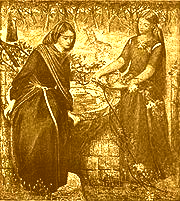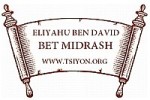|
Jacob's Family & The Tribes
of Israel
Reprint from:
Israel-a-history-of.com
The development and evolution
of the 12 tribes of Israel took place over the course of
hundreds of years. The process began with the call of
Abraham, and continued through the birth of Isaac. However,
with the birth of Jacob, and subsequently his twelve sons,
the tribes began to evolve and appear in the Old Testament.

The time period involving the
early patriarchs is far from being agreed upon. William F.
Albright, one of the leading Biblical Archaeologists of his
time, wavered on the dating of Abraham. It is generally
believed Abraham lived around 2000 B.C. Jacob, thus, has
been argued to have lived around 1850 B.C.
The unification of Israel
under Saul would not take place until around 1000 B.C. In
between, was the migration of Jacob to Egypt, the 400 year
stay in Egypt, the Exodus out of Egypt under Moses, and the
conquest of Canaan under Joshua.
These events would shape and
transform Israel from a loose confederation of tribes to a
world Empire.
However, the foundation upon
which the tribes of Israel would be built was set much
earlier, during the sojourn of Jacob and his sons, both in
Mesopotamia and in the land of Canaan.
Genesis 29:32
"And Leah conceived,
and bare a son; and she called his name Reuben: for she
said, Surely the Lord hath looked upon my affliction;
now therefore my husband will love me."
With these words were born the
twelve tribes of Israel. Reuben was the first born son of
Jacob, through his wife Leah, and would become the head of
the tribe of Reuben.
Jacob would father 11 other sons, through four different
women. Each son would become the head and founder of his
particular tribe.
The Hebrew phrase Bnei
Yisrael is used to denote the Israelites in the Bible.
The literal translation of this phrase is, "sons of Israel".
From this phrase, Scripture
uses a number of different appellations when referring to
the 12 tribes of Israel.
Throughout the Old Testament,
God's people are referred to as; "Sons of Israel"; "Children
of Israel"; "House of Jacob"; "House of Israel"; "Israel".
Mentioned as a side note
almost, in Genesis 30:21, is the birth of the only daughter
of Jacob named in Scripture, Dinah. She would later figure
prominently in the narrative. She was born to Leah, "some
time later" after the birth of Zebulun, and before
Rachel's birth of Joseph.
12 sons of
Jacob
In their order of birth, the
12 sons of Jacob are as follows: Reuben (Gen. 29:32), Simeon
(29:33), Levi (29:34), Judah (29:35), Dan (30:5), Naphtali
(30:7), Gad (30:10), Asher (30:12), Issachar (30:17),
Zebulun (30:19), Joseph (30:23), and Benjamin (35:18).
The following are the 12 sons
of Jacob grouped together by birth mother.
Leah
Reuben, Simeon, Levi, Judah,
Issachar and Zebulun
Zilpah - Leah's handmaiden
Gad and Asher
Bilhah - Rachel's
handmaiden
Dan and Naphtali
Rachel
Joseph and Benjamin
Interestingly, all but one son
(Benjamin) of Jacob was born in Mesopotamia, in the city of
Haran. Haran was also the name of the brother of Abraham who
had prematurely died (Gen. 11:28), and where he and Terah
stopped on their journey to Canaan.
This further strengthens the
Biblical ties between the Holy Land and Paddam - Aram, the
same area known as Aram - Naharaim to Abraham.
Some
[feminist] scholars have taken a
matriarchal view of the twelve tribes of Israel. This line
of thought follows the idea that the sons of Leah and Rachel
indicate an early entrance into, what would become, the
twelve tribes of Israel.
Thus, the founding tribes were
attributed to the wives of Jacob; the tribes of Leah, and
the tribes of Rachel.
The sons of Bilhah and Zilpah
indicate a later entrance into the tribes of Israel. These
tribes are less prestigious than the founding tribes.
This theory, of course, denies
the Biblical account. However, it does illuminate the
[complex] nature of Jacob's family. As was seen in the
instance of Abraham, Sarai, and Hagar, there surely existed
rivalries, jealousies, and alliances amongst the wives and
handmaidens of Jacob, as well as among the 12 sons of Jacob.
A natural result of these
alliances and rivalries would have been the formation of
cliques within Jacob's family. Power struggles were sure to
take place amongst the wives, concubines, and sons of Jacob,
each seeking to assert their place in the family hierarchy.
The interactions between each
son of Jacob would prove to form a foundation upon which the
tribes of Israel would interact with each other.
Thus, to understand the
relationship between each tribe, it is important to
understand the relationships between the sons of Jacob, and
the wives / concubines of Jacob.
_______________________________________________________
 The
Official
Tsiyon Road Android App 2.0 The
Official
Tsiyon Road Android App 2.0
Click image to
download app from Google Play
Easily
Listen to Tsiyon Road Messianic Radio from your Android device!
One listener says;
"Thanks for the new Tsiyon Road Android App. It makes it
SO easy for me to listen to all my favorite Tsiyon programs!"
________________________________________________________
 Tsiyon
Road on Glorystar Satellite! Tsiyon
Road on Glorystar Satellite!
Satellite coverage
for all of North America, Canada and much of South America. Glorystar has made an equipment package
available just for Tsiyon Road listeners. To find out more visit
our special Tsiyon Road page at:
http://tsiyon.glorystar.tv/
Need to talk to us? - In the USA and Canada just call us toll
free at (888) 230-2440 for help. Internationally, email us and we
will arrange a phone or Skype call for you.
From Eliyahu
The origin of the tribes of Israel in the family of Jacob involves
the same vices that have plagued the many generations of Israel -
and mankind generally - ever since. As we look at this story of our
nation's beginning we cannot help but be moved by the pain of heart
experienced by
Jacob and his two wives, Rachel and, perhaps especially, Leah. We
feel repulsed as we look with horror upon the naked rivalry, envy
and suffering that seems to dominate a very sad story.
However, the question must be asked: Have we been missing something?
I believe we have. While it is only natural to reject and turn away
from the unseemly side of human nature and the pain associated with
it - is in not also true that nothing can be gained until we come to
grips with the very same? Suffering that comes to nothing is indeed
a tragedy beyond words. However, suffering that produces fruit for
the Kingdom and glory to our Father in heaven - such suffering paves
the way for our very entrance into a glorious eternity! Suffering is
no stranger to the overcomer today, even as it was no stranger to
the overcoming fathers and mothers of our nation. When we take
another look at this story from this more exalted view, the
standpoint of the overcomer, we can begin to understand what this
origin story in Genesis 30 really means. Please join me for our
latest EBD Bet MIdrash as we look into this controversial
portion of Torah together, this Sabbath.
Blessings and
Shalom!
Eliyahu ben David
www.tsiyon.org
| 










 Tsiyon
Road on Glorystar Satellite!
Tsiyon
Road on Glorystar Satellite!